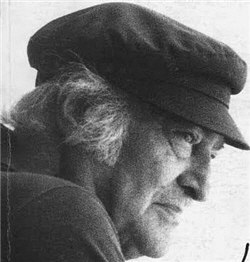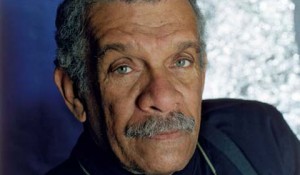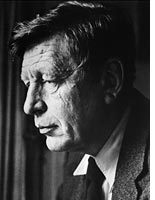A certain fatigue can set in when reading too much Derek Walcott at a go, like contending with a twice-too-large serving of boeuf bourguignon. The impression I sometimes get of him is that of a 19th century novelist who, do to a fluke paper shortage, decided to funnel his torrential sensibilities into poetry. Middlemarch filed into iambic pentameter. Or Moby Dick. Here are the opening lines of chapter 22 of his 1974 autobiographical poem, Another Life.
Miasma, acedia, the enervations of damp,
as the teeth of the mould gnaw, greening the carious stump
of the beaten, corrugated silver of the marsh light,
where the red heron hides, without a secret,
as the cordage of mangrove tightens
bland water to bland sky
heavy and sodden as canvas,
where the pirogue foundered with its caved-in stomach
(a hulk, trying hard to look like
a paleolithic, half-gnawed memory of pre-history)
as the too green acid grasses set the salt teeth on edge,
acids and russets and water-colored water,
let the historian go mad there
from thirst. Slowly the water rat takes up its reed pen
and scribbles. Leasurely, the egret
on the mud tablet stamps its hieroglyph.
There is an over-stuffedness about this, like the house of a lottery millionaire crazed for magnificence. The gift is formidable. I particularly love lines five through seven, “as the cordage of mangrove tightens/bland water to bland sky/ heavy and sodden as canvas,”. But by the time I reach line fourteen, with the historian gone mad from thirst, and realize I have been reading an actual sentence, I am quite out of breath.
V. S. Naipaul famously wrote, “History is built around achievement and creation; and nothing was created in the West Indies.” Walcott writes as if his life depended on proving this statement false. He has made it his ultimate concern to carry The Caribbean before the world, as if shouldering its golden palanquin alone, saying “Here. Here is our indispensable presence.” But, like a skilled diplomat, he is as involved with the culture he is addressing as with the culture he is presenting. And so, a dynamic tension advances on his nerves, directing his pen (one almost imagines it a quill): On the one hand he has insisted that a life in St. Lucia is all his poetry requires. The narrator of his his 2004 book, The Prodigal, is told that Paris will change his life. His response:
I like my life.
You think here is enough?
For me it is.
Fine.
Anyway I can see Martinique from here.
On the other hand, he has repudiated the “Black Word” movement, a stance towards writing espoused by the literary descendants of Langston Hughes, who believed it was critical for black writers to eschew the European tradition at every turn and blaze their own formal and linguistic trail. Walcott cites his own melting pot ancestry – Dutch and British as well as African – as evidence that Tennyson and Yeats are his inheritance as much as the African jungle. A lover of The Islands, it is Europe’s ear he cherishes.

Sam’s question, “Why is Derek Walcott considered so great?” is now, I believe, stalking its answer: I would propose that this ambivalence – his home, a twenty-seven mile by fourteen mile reprieve from Caribbean waters, held up against the legacy of Auden – is at the core of his strength as a poet. Far from dividing his art, making him half-hearted in either direction, it has given him a singleness of purpose. His outsized ambition could perhaps best be described as a West Indian iteration of Stephen Dedelus’s famous battle cry near the end of Joyce’s Portrait of the Artist as a Young Man, “to forge in the smithy of my soul the uncreated conscience of my race.” Such rhetoric is naturally vulnerable to grandiloquence, but if his poems occasionally succumb, it is the error of a gifted boy from the provinces singing too loudly in the King’s church. In this, it participates in a universal drama. It is one of the central tasks of our lives to press for certain reconciliations: between who we are and who we wish we were, what we are and what we could be, where we are, where we imagine it is better to be, and where, at last, we are most ourselves. And, in the course of these spiritual negotiations, can it be said we are, any of us, really alive if we don’t sing sometimes too loudly?
Here, from the thirteenth chapter of The Prodigal, is Walcott at his most moving . This passage comes after the narrator has journeyed to Europe, fast on the heals of self-understanding, and has returned at last to his island home.
So has it come to this, to have to choose?
The chafe of the breakers’ moving marbles,
their lucent and commodious statuary
of turbulent stasis, changing repetition
of drizzling spray that glazes your eyes
like the marble miracles of the Villa Borghese?
Do not diminish in my memory
villages of absolutely no importance,
the rattleing bridge over the stone-bright river,
un-ornate churches, chapels in the provinces
of light-exhausted Europe. Hoard, cherish
your negligible existence, your unrecorded history
of unambitious syntax, your clean pools
of unpolluted light over close stones.





